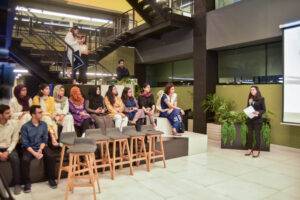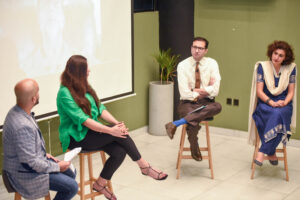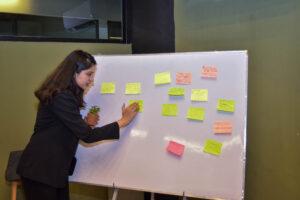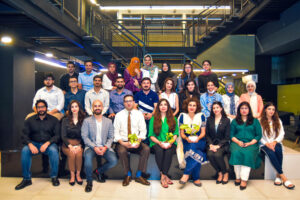
Air Pollution was the focus of a Public Dialogue held by TEDxLahore last week. A youth-powered initiative, the program was supported by the TEDx Global Innovation Network.
The public dialogue was held at Daftarkhwan, with support from Global Shapers Lahore and Women in Energy Pakistan.
The event noted the absence of real-time information on leading pollutants and hazardous air. The core organisers consisting of Irteza Ubaid, Mariam Raheem and Maha Kamal, learned that there is limited understanding of the state of air quality, its policy implications and ultimately, the hazards of breathing toxic air for prolonged periods of time. Building on prior experience and engagements with stakeholders, there were three aims of the event:
The session opened with a talk by Dr. Shahana Khurshid, a LUMS professor who is a PhD in Environmental Engineering from the University of Texas at Austin. Her research explores air pollutants & their ability to cause adverse health effects.

Dr. Khurshid took the audience through the top 10 diseases that kill human beings, including respiratory diseases and cancers. She noted that 7 million premature deaths occur each year due to air pollution, underscoring the gravity of the problem.
She asked why we should worry about the minuscule smog particles, telling everyone that they do not break down or wash away with mucus, can reach our lungs like violent invaders and can wage a war on our respiratory and overall health.
Some of the major culprits of air pollution were identified as unsustainable transport, industrial emissions, brick kilns, burning of plastics & unprocessed waste follow behind. “
“The time for demanding sustainable public transport was 20 years ago... or now,” Dr Khurshid said.
Soon after the talk, speakers were invited for a panel discussion on the impact of air pollution on our lives, economy, state of being altogether, moderated by Omer Zaheer.
Climate Lawyer, Sara Hayat, who is a consultant specialising in climate change law and policy, and works with the government and international organisations was said that weak law enforcement was a major obstacle in tackling air quality. "The problem of Pakistan isn't lack of laws; it's the enforcement of those laws,” said Hayat.

She noted that “smog season” in Lahore is often used colloquially, but that “smog is always present across the country in different ways. Our air quality is not good no matter what season it is,”.
Local government and cities expert Ahmad Iqbal seconded her thoughts, while adding thoughts on the inequality of the effects of smog.
"The people who are most exposed to climate change and the worst effects of smog are the people who do not even contribute to it. Those who pollute ultimately take precautions in their homes. The ones who are most affected don't even know how they are affected,” Iqbal said.
He also emphasised the need to hold local polluters accountable with industry standards and vehicle emission tests.
Adding to the discussion, eminent economy expert Ali Khizar looked at the economic impact stating that “We need to go beyond semantics to truly understand the impact. It would require concentrated effort from government,” he said. “Multifaceted research in vehicular emission and fuel quality is needed.”
The speakers stressed upon individual action saying that everyone needs to come together, and play their part.

"You have the tools to raise your voice and be heard," Hayat said. “People's attitudes matter. People have the power to make something cool, make public transport and car-pooling cool!"
“Human-centric design is missing, sustainability ignored. Local government structures matter in helping create sustainable systems and services. They matter globally in mitigating effects of climate change. Sadly, in Pakistan local government is in shambles. Citizens must hold their representatives accountable," Iqbal stated.
The floor was then opened for a hackathon, led by Ms. Mariam Khalid of Women in Energy Pakistan and Ms. Mariam Raheem, Curator of Global Shapers Lahore. It was a diverse group of over 40 students, climate change, and other grassroots initiatives who brainstormed ideas using design thinking tools to curb air pollution on a systems-level.
Overall, the session served as a springboard for new approaches and ideas meant to tackle the multifaceted problem of Air Pollution in Lahore, and may nudge consumers and producers transition away from a 'take-make-waste' economy.
The public dialogue was held at Daftarkhwan, with support from Global Shapers Lahore and Women in Energy Pakistan.
The event noted the absence of real-time information on leading pollutants and hazardous air. The core organisers consisting of Irteza Ubaid, Mariam Raheem and Maha Kamal, learned that there is limited understanding of the state of air quality, its policy implications and ultimately, the hazards of breathing toxic air for prolonged periods of time. Building on prior experience and engagements with stakeholders, there were three aims of the event:
- Encourage public discourse on Lahore’s worsening air quality.
- Introduce a design thinking hackathon to co-design solutions to curb air pollution.
- Prototype and implement feasible solutions with the help of local partners.
The session opened with a talk by Dr. Shahana Khurshid, a LUMS professor who is a PhD in Environmental Engineering from the University of Texas at Austin. Her research explores air pollutants & their ability to cause adverse health effects.

Dr. Khurshid took the audience through the top 10 diseases that kill human beings, including respiratory diseases and cancers. She noted that 7 million premature deaths occur each year due to air pollution, underscoring the gravity of the problem.
She asked why we should worry about the minuscule smog particles, telling everyone that they do not break down or wash away with mucus, can reach our lungs like violent invaders and can wage a war on our respiratory and overall health.
Some of the major culprits of air pollution were identified as unsustainable transport, industrial emissions, brick kilns, burning of plastics & unprocessed waste follow behind. “
“The time for demanding sustainable public transport was 20 years ago... or now,” Dr Khurshid said.
Soon after the talk, speakers were invited for a panel discussion on the impact of air pollution on our lives, economy, state of being altogether, moderated by Omer Zaheer.
Climate Lawyer, Sara Hayat, who is a consultant specialising in climate change law and policy, and works with the government and international organisations was said that weak law enforcement was a major obstacle in tackling air quality. "The problem of Pakistan isn't lack of laws; it's the enforcement of those laws,” said Hayat.

She noted that “smog season” in Lahore is often used colloquially, but that “smog is always present across the country in different ways. Our air quality is not good no matter what season it is,”.
Local government and cities expert Ahmad Iqbal seconded her thoughts, while adding thoughts on the inequality of the effects of smog.
"The people who are most exposed to climate change and the worst effects of smog are the people who do not even contribute to it. Those who pollute ultimately take precautions in their homes. The ones who are most affected don't even know how they are affected,” Iqbal said.
He also emphasised the need to hold local polluters accountable with industry standards and vehicle emission tests.
Adding to the discussion, eminent economy expert Ali Khizar looked at the economic impact stating that “We need to go beyond semantics to truly understand the impact. It would require concentrated effort from government,” he said. “Multifaceted research in vehicular emission and fuel quality is needed.”
The speakers stressed upon individual action saying that everyone needs to come together, and play their part.

"You have the tools to raise your voice and be heard," Hayat said. “People's attitudes matter. People have the power to make something cool, make public transport and car-pooling cool!"
“Human-centric design is missing, sustainability ignored. Local government structures matter in helping create sustainable systems and services. They matter globally in mitigating effects of climate change. Sadly, in Pakistan local government is in shambles. Citizens must hold their representatives accountable," Iqbal stated.
The floor was then opened for a hackathon, led by Ms. Mariam Khalid of Women in Energy Pakistan and Ms. Mariam Raheem, Curator of Global Shapers Lahore. It was a diverse group of over 40 students, climate change, and other grassroots initiatives who brainstormed ideas using design thinking tools to curb air pollution on a systems-level.
Overall, the session served as a springboard for new approaches and ideas meant to tackle the multifaceted problem of Air Pollution in Lahore, and may nudge consumers and producers transition away from a 'take-make-waste' economy.

